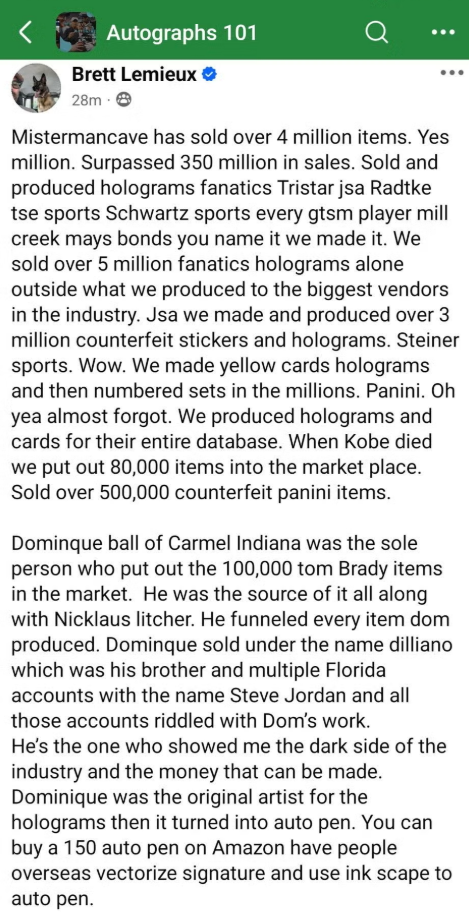In an explosive discovery that has sent shockwaves through the world of sports memorabilia, authorities in Indiana have unearthed a staggering counterfeit scandal tied to one of the industry’s own. Brett Lemieux, an autograph dealer whose name was respected—albeit with a hint of whispered skepticism—has posthumously become a notorious figure following his unexpected death amid a police crackdown.
The Hamilton County community is still reeling from the news that Lemieux, aged 45, died from an apparent self-inflicted gunshot wound during a police raid in Westfield. The tragic sequence of events occurred as law enforcement executed a search warrant linked to an elaborate scheme alleged to implicate Lemieux at its core. On the charge sheet? Nothing less than the sale of millions of dollars’ worth of bogus sports memorabilia, enough to potentially warp the market dynamics of collectibles for the foreseeable future.
The saga kicked off with a post in the “Autographs 101” Facebook group, attributed to Lemieux. In this startling confession, Lemieux admitted to orchestrating a fraudulent operation that he asserted had circulated over four million counterfeit sports items. With claims of sales reaching an eye-watering $350 million, collectors and insiders alike were thrown into a tumultuous whirl of disbelief and shock. How many cherished items, delicately framed or lovingly displayed, were nothing more than cleverly engineered fabrications?
Operating under the business avatar ‘Mister Mancave,’ Lemieux was reputed for declaring his business as the possessor of “the largest framed jersey inventory on the web.” However, a closer examination reveals both mystery and intrigue—while the business listed Columbus, Ohio as its domicile, there was no brick-and-mortar storefront to speak of. Moreover, its official records indicate multiple incorporations in Indiana from 2018 to 2023, suggesting that U-turns and obfuscation might have been routine for Lemieux’s operations.
Further unraveling the tangled web of deceit, Lemieux admitted in his virtual confession to fabricating the hologram stickers widely utilized by top-notch authentication enterprises like Panini, Fanatics, Tri-Star, and James Spence Authentics. The market faced a gut-wrenching blow when Lemieux detailed a specific operation following Kobe Bryant’s tragic demise in 2020. He claimed to have flooded the market with 80,000 fake Bryant memorabilia items, each adorned with what seemed astride the penumbra of authenticity—faux authentication holograms stealthily embedded.
Nor were the impostures limited to the basketball court. Lemieux’s brazen undertakings extended to baseball, for instance, pitching an Aaron Judge-signed ball for a cool $399, cloaked with a Fanatics hologram. Invested insiders knew something was amiss, given that a sanctioned autograph might normally command nearly double the price through official channels. Still, venal ingenuity and the subterfuge of the fake stickers effectively cloaked this subterfuge into unbothered acceptance.
In the inescapable aftermath, industry leaders now face the herculean task of piecing together frayed consumer trust. Fanatics, standing as one of the cornerstones in autograph authentication, announced forthright that a technological facelift of its hologram systems transpired two years prior—a preemptive strike in combating precisely this ilk of counterfeit malfeasance. The company has pledged ongoing collaboration with both law enforcement and intellects from former FBI operatives to fend off more fakes from further infiltrating the hands of eager collectors.
As far-reaching disputes wage debate over the veracity of Lemieux’s staggering $350 million sales figures, the circumstantial fallout is indisputable. Experts in authentication, like the highly regarded Steve Grad, underscore that the advent of ‘autopen’ signatures ushers in new, confounding challenges in discerning authenticity. The repercussions of this eruptive case are set to reverberate throughout the memorabilia industry, as genuine items risk tainting by association.
For some, this decaying chapter in memorabilia lore arrives not as a bolt from the blue. Fellow dealers exchanged tales of Lemieux’s uncanny stock of signatures from athletes allegedly cemented in a hiatus of autograph giving. Consequently, industry actors named in the digital “manifesto,” such as Dominique Ball of Indiana and Wisconsonian Nickolas Litscher, adamantly declare disassociation, with Litscher reportedly maneuvering legal recourse after unwelcome online linkages.
As authorities delve deeper, they suspect Lemieux orchestrated a nebula of business facades, including Ultimate Sports, Athletes One, Signature Dog, and All-American Authentics, each potentially part of this elaborate masquerade.
In this period of uncertain authenticity, collectors find themselves at a sobering crossroads—questioning the genuineness of the memorabilia dotting their lives and serving as a reminder that vigilance and adaptive fraud prevention must remain perennial stalwarts in the sports collectibles domain.
